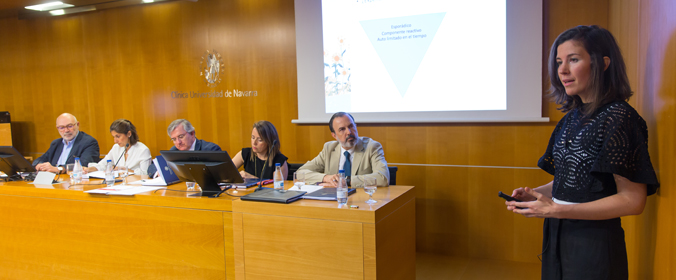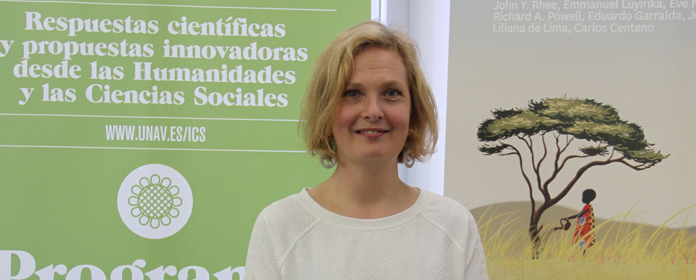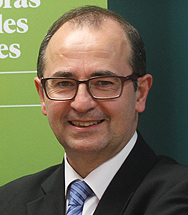Alazne Belar defends her thesis on patients’ experiences regarding the desire to die when suffering from terminal disease
Belar’s research is part of the ATLANTES program of the Institute for Culture and Society

FOTO: Manuel Castells
Alazne Belar, a PhD student within the ATLANTES Program of the Institute for Culture and Society (ICS) at the University of Navarra, defended her doctoral thesis entitled “Patients’ experiences regarding the desire to die when suffering from terminal disease: A prevalence study and associated factors in a Spanish population” as part of the Doctoral Program in Applied Medicine and Biomedicine.
Her research involved quantitative analysis of data obtained through interviews with 200 patients at the Clínica Universidad de Navarra and the Palliative Care Unit at the San Juan de Dios Hospital in Pamplona.
11% of the research participants sporadically expressed “a desire to die” at some point in their illness; 7% of these experiences involved a more persistent desire and 1% involved active consideration of speeding up death. Given this, Belar notes that, “We should never judge patients; all these experiences are valid and reflect their suffering. ”
In addition, she believes that these expressions open a door toward exploration and understanding and that they can be a starting point for talking about the end of life and death. "We have seen,” as she points out, “that talking about these issues does not hurt patients and they are often grateful to have the opportunity to express what they feel without being judged."
Belar believes it is essential to better understand patients’ experience since “a range of experiences exist and it is not fitting to talk about them without taking into account the nuances that each expression entails.” She further explains that terminal illness is a dynamic experience with more than one feeling possible—like wanting to both live and die—and that these desires fluctuate over time.
According to her, these feelings are pulled and pushed by factors, such as existential, psychological, social and personal aspects, that can be addressed.
Attending to patientsIn this sense, the recent PhD recipient emphasizes the importance of listening to and understanding patients since these expressions have different meanings. Some patients who express a "desire to die" sometimes "mean to say that they cannot handle it any longer, that they need help, that they want to live, but in another way, in a better way, for example, without pain,” she points out.
She notes that the first thing is to identify and recognize the patient's experience. She warns us that, "if the patient's experience is not fully understood, an inappropriate diagnosis or treatment can emerge, resulting in sub-optimal care for that person."
Once this experience is detected, she insists that healthcare professionals should talk with the patient without judging him, create empathy and trust and provide him with the necessary care.
We have seen, "as she points out, "that talking about these issues does not hurt patients and they are often grateful to have the opportunity to express what they feel without being judged. " Such conversations have been shown not toexacerbatepatients’ depression or anxiety.
The researcher emphasizes the importance of better understandingpatients’ experiences in order to offer comprehensive care. She also reminds us that, "the kind of care a patient receives can influence her experience with illness."
Within the framework of her doctoral thesis, Belarundertook a research stay at the University Hospital Center of Vaud (CHUV) in Lausanne (Switzerland) thanks to a pre-doctoral international mobility grant that the Government of Navarra awarded her. There,she was able to compare data and devise new hypotheses under the direction of Philip Larkin, a professor of palliative care at the University of Lausanne, and academic director of Lausanne’s Institute for Healthcare Education.
With her doctoral thesis complete, Belar will continue her research at the ICS as part of the research group on “Dignity and desires to die in patients with advanced disease: Study of the associated factors and patients and professionals’ experiences.” This research is part of the ATLANTES Program and receives funding from the Carlos III Health Institute backed by the Spanish Ministry for Science, Innovation and Universities.




